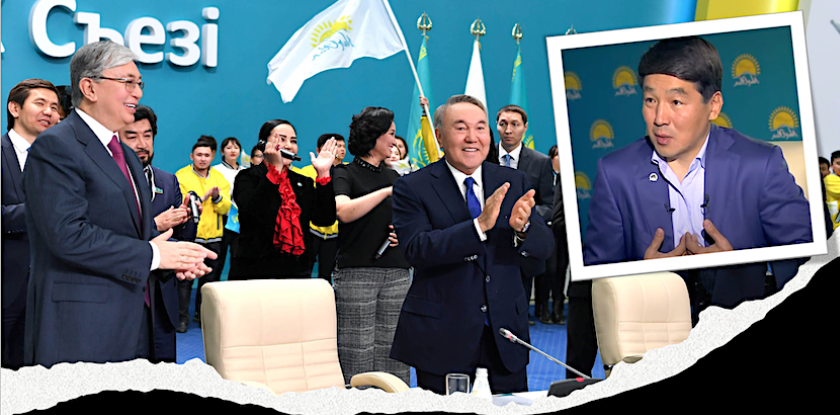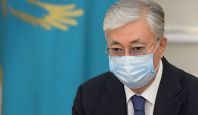Perhaps no one in Kazakhstan has any doubts about the fact that Nur Otan is going to win the upcoming parliamentary elections. For this reason, those who are interested in domestic policy are mainly discussing two crucial issues – how many parties will make it to the Parliament and how one may use the preexisting domination of the Elbasy’s party in order to deliver an attack on the present system.
Ordinary people, in their turn, must ask themselves these questions – is the country going to change after Nur Otan’s next victory?
Can the Kazakhs count on Nursultan Nazarbayev’s party to make their lives better and happier?
In our opinion, “no” is the answer to both of these questions. If only because, as history teaches us, any political organisation must become “alive” in order to be able to lead the people and change the country.
One must admit that an attempt to “revive” Nur Otan did take place. We are talking about the intra-party primaries sanctioned by the party’s leader Nursultan Nazarbayev and his first deputy Bauyrzhan Baybek. The fact that the whole thing was nothing but flogging a dead horse is another matter.
Still, since the attempt had been made, one can definitely credit Mr. Baybek with it. At the same time, we suspect that the Elbasy’s other allies would never risk attempting anything of the sort. Not because they are less smart or more cowardly but because they remember full well the consequences of the perestroika that Mikhail Gorbachev conducted one third of a century ago.
For this reason, we are certain that the Nur Otan party will get a real chance to change only when its current leader Nursultan Nazarbayev departs from this life and several crucial issues appear on the agenda – who is to become the party leader, who will be a part of its top-management, how will the decisions be made and implemented, will the party as a whole be able to influence the state vertical and policy and, if so, in what way.
Moreover, we believe that changes in the Nur Otan party after the Elbasy’s passing are as inescapable as sunset and sunrise. Therefore, we are waiting for the process to start. At this point, however, we will only comment on the results of the intra-party Baybek-style “perestroika”. Which is not going to be hard due to the fact that the latter is actively posting on social networks about the party’s and his own successes.
Here is a post of Nur Otan’s first deputy head published on November 13, 2020, and reposted on the party’s website under the title “The Results of the Second Round of Nur Otan’s Intra-Party Primaries Counted” (text in bold by KZ.expert).
“I would like to sum up some basic results. First. We have completed the forming of the party lists for the maslikhats of all levels. 6253 party members have made it to the Nur Otan party lists as 216 maslikhats nominees. As you recall, more than 10 thousand candidates participated in the first round of the primaries. More than 662 thousand people or 84% of all the party members participated in the nationwide online voting that took place on October 1st – 4th, 2020. As part of the second round of the primaries, more than 10 thousand of electoral delegates representing more than 4.5 thousand primary party organisations participated in the online voting at the regional and city party conferences. All the conferences and debates were broadcasted online on social networks which ensured the transparency and openness of the electoral process.
Second. Nur Otan’s people’s lists have also been formed. As analysis has shown, the presence of women has increased from 22% to 34%, the presence of the young generation has increased by 3.5 times, from 7% to 24%. Compared to the current party’s membership, the average age of the new candidates has become 7 years younger – from 51 years old to 44 years old. Currently acting deputies constitute 24% of the party lists; the new people constitute 76%. This has allowed us to satisfy the society’s demand for the change. With that, more than 42 supporters have become new party members. More than 1000 of them have participated in the intra-party elections, every third person has made it to Nur Otan’s party lists”.
Let us start by saying that Nur Otan’s leadership did not dare to hold real primaries, in other words, to conduct the direct intra-party elections to the Mashilis of the Kazakh Parliament and to the maslikhats of all levels. Instead, it had conducted the two-round selection of those wishing to become deputies.
Bauyrzhan Baybek himself unequivocally testifies to this fact in the post presented above.
On one hand, the reasons for such caution are quite clear – a managed democracy is an integral part of authoritarian political systems. On the other hand, this caution may indicate that the party’s top leadership represented by Nursultan Nazarbayev, his relatives and allies simply does not trust the middle and the low sector of the party apparatus and, in fact, does not trust the party members themselves. Therefore, the leadership has chosen to be on the safe side.
By the way, thanks to Bauyrzhan Baybek’s post, we have finally leaned the current numerical strength of the “ruling and guiding force of the Kazakh present”. If we are to devide the 662 000 people allegedly participated in October 1-4 elections into 84% and then multiply it by 100%, we will get 788 000. If we compare this figure with the number of those who have joined the party during the primaries (42 000 persons), we will see that the Elbasy’s party has grown by 5% only.
Of course, out of these 42 000 new members, about 1000 people have participated in the primaries and only one third of this thousand has made it to the party lists, in other words, we are talking about 333 persons.
Since the total number of the Mashilis and maslikhats deputies constitutes about 6500 people, it means that the share of the new members equals 5%. In other words, they did not get the advantage over the “old folks”.
If we recall the CPSU and its predecessor AUCP (b) party drafts, especially during the first years of the Soviet regime, it is not hard to see that Nur Otan’s election campaign aimed to attract new members is rather an imitation of a frenzied activity than a true initiative.
The second post of Nur Otan’s first deputy head released on November 18, 2020, under the title “The Results of the Second Round of Nur Otan’s Intra-Party Primaries Counted” contains interesting information confirming our observations about the presence of a “managed democracy” in the Elbasy’s party. Here is a quote from Bauyrzhan Baybek’s post.
“And so, it was only yesterday that the third round of the primaries ended. The candidates for Nur Otan’s party list for the Mashilis of Kazakhstan’s Parliament had been selected from 17 regions.
Based on the results of the debates, out of the 267 candidates, 78 persons had been elected via secret rating online voting. 9 candidates represent new party members who have joined our ranks in order to participate in the primaries. Out of the acting Mashilis deputies, 5 persons are included in the party list”.
We do not know how many people will make it to Nur Otan’s party list at the January 10, 2020, parliamentary election albeit their number is unlikely to surpass 200. Probably, even less, say 2 persons per each deputy’s seat allocated for the ruling party according to Akorda’s secret plans. Which means that the primaries winners who have made it to the list through the intra-party elections (not even directly but via the two-round selection process) will constitute not more than 40% while the new members will constitute not more than 5%.
This is a clear indicator that Kazakhstan’s ruling party is the party of Nazarbayev and his clan that are ready to play democracy but are unwilling to obey its rules.
Nonetheless (let us repeat) chances that Nur Otan may sometime come to life again do exist. For this to happen, the following must occur – 1) Nursultan Nazarbayev must pass away; b) the ruling elite must start fighting for power in the party field; c) the intra-elite conflict must intensify to the point of splashing out and affecting the party itself.
It is only then when Nur Otan may grow into a real political force. So far, it is but a political mummy whose limbs are being moved only when the authorities need to show to the world that Kazakhstan is not devoid of democracy. Usually, it takes place before elections.





